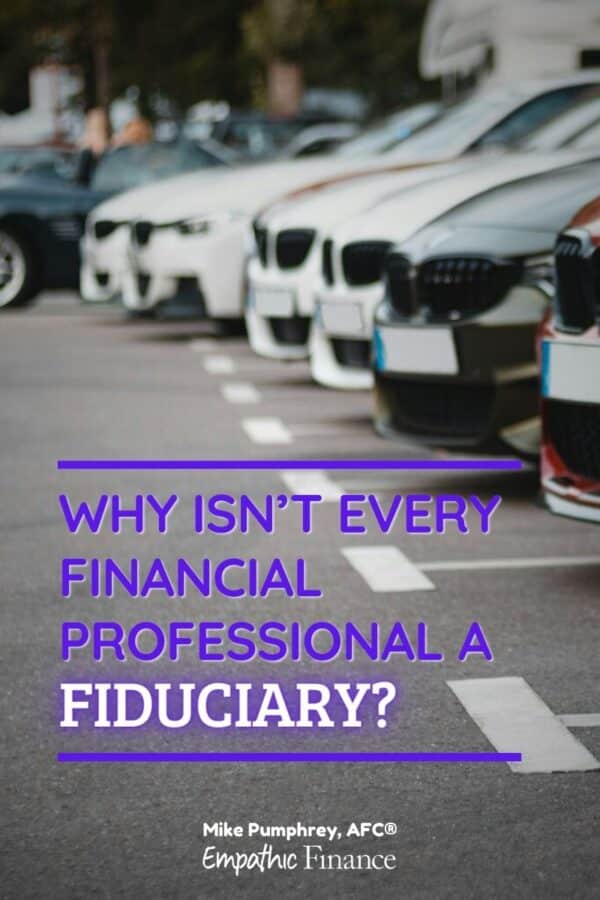As new laws strengthen rules on being a fiduciary and acting in a client’s best interest, it’s harder to justify working with anyone else.
Nothing here is financial advice. Please read my disclosure policy.
The word “fiduciary” feels like a complex, hard-to-understand concept, something like “price to earnings ratio” or “amortization”.
But it’s actually a fairly simple concept, and one that everyone should be familiar with. Investopedia states:
Fiduciaries are persons or organizations that act on behalf of others and are required to put the clients’ interests ahead of their own, with a duty to preserve good faith and trust. Fiduciaries are thus legally and ethically bound to act in the other’s best interests.
More simply, it’s a financial professional who is legally bound to act in your best interest.
There is recent regulation going forward here in the U.S. that would codify who actually is legally bound to be a fiduciary.
Now, a good question you might have is this: “Why would you ever want to work with someone who wasn’t bound to act in your best interest?”
And the only response, of course, is, “Exactly! You wouldn’t.”
Table of Contents
Financial professionals and being a fiduciary
I sometimes like to joke and say that there are two types of financial planners: the ones that are are fee-based, and the ones you don’t want to work with.
That other type is commission-based. What that means is that they get a commission (a cut) when you invest your money in certain products and services. The companies pay them, directly or indirectly.
This presents a classic conflict of interest. How can you know if a professional is recommending a product or service because it’s good for you, or it’s good for them? You can’t.
This is one of many reasons why there are no ads or affiliate links on this site. I don’t take commissions. I don’t get kickbacks. If I recommend a service, it’s because I recommend it. I make no money from anything other than my coaching services.
But the commission-based financial model is an example of the challenges a client faces with working with someone who isn’t a fiduciary.
The laws might change
Amazingly, this all is legal. You are 100% allowed to be a financial professional and not be held to a fiduciary standard. I don’t get it, but that’s how things stand.
But the laws around this might be changing, as they have been for decades.
First of all, even in the last few years, the laws have changed.
In 2016, the Obama administration pushed to put stricter investor protections into place. This appeared to require all financial advisors to be fiduciaries, if I’m reading it correctly.
However, the law was never put into place, as it was halted by a court in 2018.
Meanwhile, in 2019, the S.E.C. enacted a law called “Regulation Best Interest” which requires brokers to act in their customers’ best interests when making securities recommendations to retail customers.
But there is still some complexity and wiggle room apparently. And so there is a push by the Biden Administration to tighten these investor protections. From the press release:
“[T]hese critically important proposals protect retirement investors by requiring firms and people who provide retirement investment advice for a fee or other compensation to adhere to high standards of care and loyalty, and generally avoid engaging in transactions where they have unchecked conflicts of interest that could lead them to favor their own interests at the retirement investor’s expense.”
You can bet that even if this is put into effect that some will still try and wiggle out of this.
Everyone should be a fiduciary
I have never been convinced by anyone that there is a justified reason for a professional to not be bound to act in a client’s best interest. And frankly, that’s true in financial matters and other matters as well.
Wouldn’t it be nice if you could buy a car from a salesperson who you knew was a fiduciary? How much different would it be to go shopping for a mattress, a stereo, a guitar, a home, anything, knowing that the person who was helping you was legally obligated to work in your best interest?
As far as I’m concerned, everyone should be a fiduciary.
But maybe that’s a bit naive of me. Well, how about this instead: if a person isn’t a fiduciary, then they should very well be able to explain to you why not.
I’m not saying all salespeople are bad. The best salespeople create win-win situations: they make money, you get a fair deal. I’m just saying that any regulation that mandates that someone act in your best interest is a good deal in my book.
It’s how I run my business, and I would expect nothing less from anyone else.



